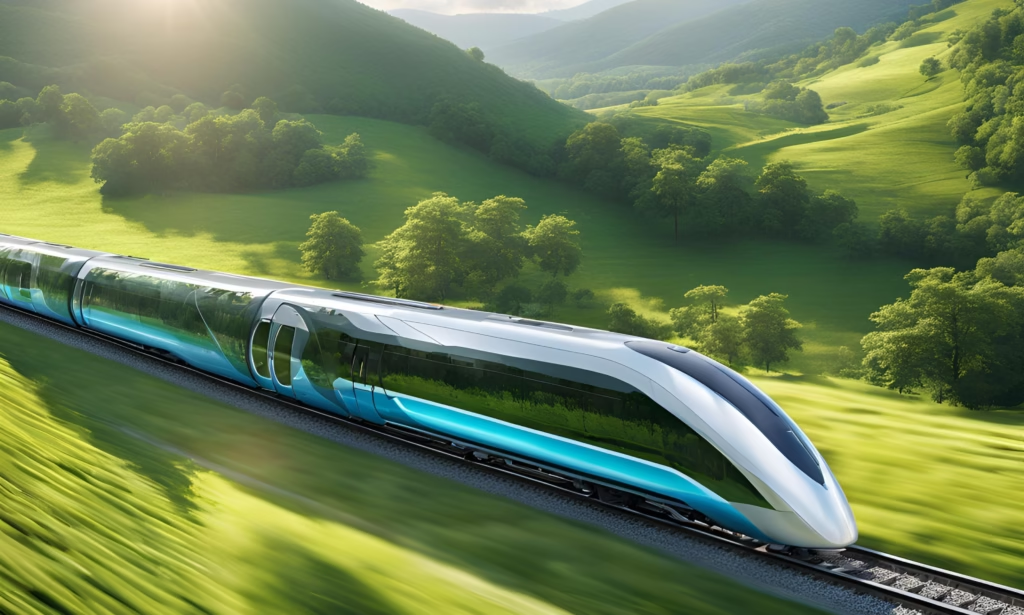Indian Railways Set to Launch First Hydrogen-Powered Train Trials in December 2024
Hydrogen-powered trains are set to mark a major milestone in Indian Railways’ sustainability journey, with the first trials scheduled to begin in December 2024.. This groundbreaking project represents a major leap toward reducing the carbon footprint of India’s vast railway network while promoting the use of clean energy technologies.
Hydrogen Train Trials on the Jind-Sonipat Route: Paving the Way for Green Transport
The initial trials for India’s first hydrogen-powered train will take place along the 90-kilometer Jind-Sonipat route in Haryana. This test route has been selected due to its moderate traffic flow and the availability of the necessary infrastructure. By embracing hydrogen-powered trains, Indian Railways is aligning itself with global sustainability trends, working to reduce its environmental impact, and aiming to achieve net-zero carbon emissions by 2030. The trials will focus on assessing the train’s performance, efficiency, and safety standards, ensuring that it meets the high standards expected for wider deployment.
Revolutionizing Rail Transport with Hydrogen-Powered Trains
Hydrogen-powered trains are at the forefront of sustainable transportation, representing a breakthrough in rail technology. Unlike traditional diesel engines, these trains run on hydrogen fuel cells, which generate electricity by combining hydrogen and oxygen. The byproduct of this process is simply water vapor, making hydrogen trains a completely zero-emission alternative to conventional locomotives. This aligns perfectly with India’s environmental goals, contributing to reducing greenhouse gas emissions and lessening reliance on fossil fuels.
By implementing hydrogen-powered trains, Indian Railways aims to address several critical environmental and operational challenges. These trains promise to offer a quieter, more energy-efficient alternative to diesel-powered trains, making them ideal for routes that are not yet electrified. Additionally, hydrogen fuel cells are seen as a more sustainable energy source in the long run, especially as the production and availability of hydrogen fuel increase.

Key Features and Advantages of Hydrogen-Powered Trains
Hydrogen-powered trains come with several compelling advantages that set them apart from traditional rail systems. Some of the key benefits include:
- Zero Emissions: Hydrogen-powered trains produce zero greenhouse gases during operation, making them a crucial tool in reducing the environmental impact of rail transport.
- Cost-Efficiency: Over time, as hydrogen fuel production scales up, the cost of running these trains could be more economical than traditional diesel-powered options.
- Energy Efficiency: These trains are not only more efficient but also operate more quietly than their diesel counterparts, improving the passenger experience and reducing noise pollution.
- Adaptability: Hydrogen trains are especially valuable for non-electrified routes. Since they do not require the installation of expensive overhead electrification, they provide a cost-effective solution for regions that lack full electrification.
Scaling Up: Indian Railways’ Vision for a Green Future
The trial of the hydrogen-powered train on the Jind-Sonipat route is just the first step in Indian Railways’ broader vision for a sustainable, green future. Indian Railways intends to introduce 35 hydrogen-powered trains nationwide by 2025. These trains will primarily operate on non-electrified tracks that currently rely on diesel engines, offering a cleaner and greener alternative for long-distance travel.
To support this shift, Indian Railways is working closely with key stakeholders to develop the necessary hydrogen production and storage infrastructure. This initiative will not only benefit the hydrogen train project but will also contribute to India’s larger mission to promote green hydrogen technology as a sustainable energy source.
India Joins the Global Shift Toward Hydrogen-Powered Rail
India’s move to introduce hydrogen-powered trains places it among an elite group of countries leading the way in hydrogen-based rail transportation. Germany, for example, has already deployed commercial hydrogen-powered trains, proving that this technology is viable and efficient. With this strategic initiative, India is demonstrating its commitment to adopting global best practices in clean energy while addressing its own transportation challenges.
A Sustainable Future: Indian Railways’ Role in Green Innovation
The introduction of hydrogen-powered train trials is a major milestone in Indian Railways’ long-term strategy to transition to sustainable energy sources. As one of the world’s largest and busiest rail networks, India’s adoption of hydrogen-powered trains could set a global example for other nations seeking to decarbonize their transport systems.
By embracing cutting-edge technology and promoting innovation, Indian Railways is not only tackling environmental concerns but also supporting the growth of the green energy sector in India. This move reflects the nation’s ongoing commitment to balancing progress with environmental stewardship, working towards a future that prioritizes both sustainable development and economic growth.
Conclusion: Paving the Path to a Cleaner, Greener Future
The trials of hydrogen-powered trains by Indian Railways are a pioneering effort in the realm of eco-friendly transportation. This significant step will help reduce the country’s reliance on fossil fuels, lower carbon emissions, and pave the way for cleaner, more sustainable rail transport. With ambitious plans for the future, Indian Railways is setting an example for the world, showing that technological innovation and sustainability can go hand in hand.
As India continues to advance toward its green energy goals, the adoption of hydrogen trains is not just an environmental initiative; it is also a forward-thinking approach that ensures economic growth while protecting the planet. This initiative marks the beginning of a cleaner, greener, and more sustainable era for Indian Railways and the entire country.
for more VISIT